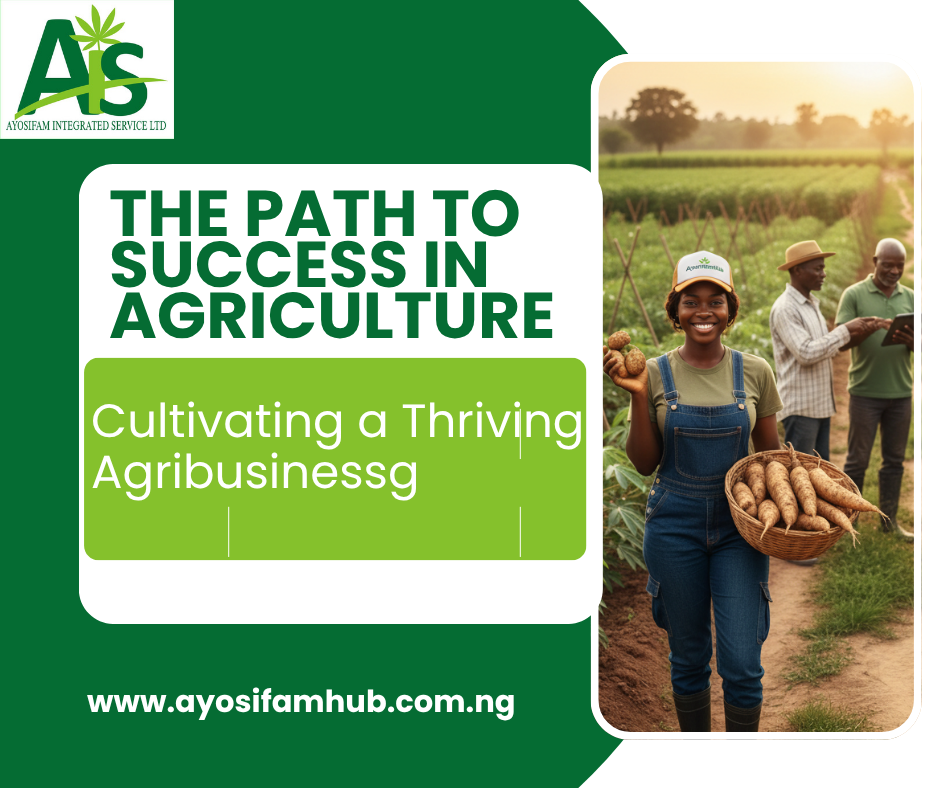Welcome to AyosifamHub, the place where we turn agricultural potential into tangible prosperity!
Farming is more than just planting seeds and harvesting crops; it’s a dynamic, essential, and rewarding business venture. For smallholder farmers and aspiring agribusiness entrepreneurs across Nigeria, the path to success requires blending age-old wisdom with modern, strategic thinking.
Here is your essential roadmap to cultivate a thriving and resilient agricultural enterprise.
1. Build a Solid Foundation: Strategy and Planning
You wouldn’t build a house without a blueprint, and the same principle applies to your farm. A successful agribusiness is founded on clear goals and meticulous planning.
First, conduct thorough market research. Don’t just grow what everyone else is growing. Research market demand for crops like cassava and potatoes, and explore opportunities in value addition (e.g., cassava flour, potato flakes, fortified animal feed). Identify your target customers—whether they are local markets, restaurants, or industrial processors.
Next, develop a business plan. This is your roadmap. It should outline your objectives (e.g., a 25% yield increase in two years), your financial projections (costs for seeds, fertilizer, labour, and expected revenue), and your marketing strategy (how you will sell your produce).
Finally, choose your niche. Specialization can set you apart. Determine if you are focusing on organic farming, a specific high-demand crop variety, or creating a unique value-added product. Become an expert in your chosen area—and remember that AyosifamHub is always here to provide insights on market trends and high-potential crops like cassava and potato.
2. Master the Science: Efficiency and Innovation
Successful farming in the 21st century means embracing practical innovations that boost yield and conserve resources.
Begin by prioritizing soil health and sustainability. Your soil is your greatest asset. Implement sustainable practices like Crop Rotation to prevent soil exhaustion and break pest cycles. Utilize Agroforestry, a practice AyosifamHub strongly champions: planting nitrogen-fixing trees can naturally enrich your soil and reduce the need for expensive synthetic fertilizers. Also, learn to make and use your own Organic Inputs, such as vermicomposting, as it is a low-cost, high-impact method to improve crop quality.
Next, adopt resource-smart technology. Precision agriculture doesn’t always mean expensive drones. For smallholders, it can be as simple as using Drip Irrigation to ensure water is delivered directly to the root zone, maximizing efficiency, especially during dry seasons, and investing in Improved Seeds (high-quality, disease-resistant varieties) which will dramatically impact your final yield.
Lastly, embrace data-driven decisions. Keep meticulous records of your planting times, input costs, and final yields. Analysing this data will show you what works and where to adjust your processes to maximize profit.
3. Move Beyond the Farm Gate: Value Addition and Marketing
The greatest wealth in agriculture often lies not in the raw commodity, but in the final product.
Remember that Value Addition is King. As we championed in a previous post, processing your raw cassava or potato into a higher-value product creates new, expanded market opportunities. This step stabilizes your income and protects you from price fluctuations in the commodity market—AyosifamHub is dedicated to helping farmers access the technology and training needed for this transformation.
You must also build a strong market presence. This involves using Direct Sales, where you engage in local farmers’ markets or direct-to-consumer schemes. It also means Networking by connecting with restaurants, schools, and local businesses that could become bulk buyers. Finally, establish a Digital Presence—even a simple social media page can help you advertise your farm’s products and story.
4. Nurture Growth: Learning and Community
Agriculture is an ever-evolving field. The most successful farmers are lifelong learners who build strong support systems.
You must build your network. Connect with other farmers. Join co-operatives or agricultural associations. Sharing knowledge, resources, and even equipment can help you overcome challenges. This community also provides a safety net and collective bargaining power.
Be sure to seek mentorship and training. Attend workshops, seminars, and training sessions offered by agricultural extension services or organizations like AyosifamHub. Learning from the successes and failures of experienced farmers is invaluable.
Finally, be resilient to challenges. The path will have setbacks—unpredictable weather, pests, or market dips. Success is less about avoiding these and more about your resilience and adaptability. Learn from failures, adjust your plan, and keep striving for improvement.
The journey to success in agriculture is a marathon, not a sprint. By combining a strategic business mindset, a commitment to sustainable innovation, and a proactive approach to learning, you can transform your farm into a profitable, resilient, and thriving agribusiness.
Are you ready to cultivate your success?




